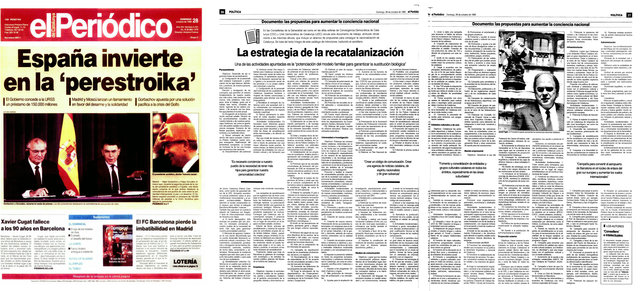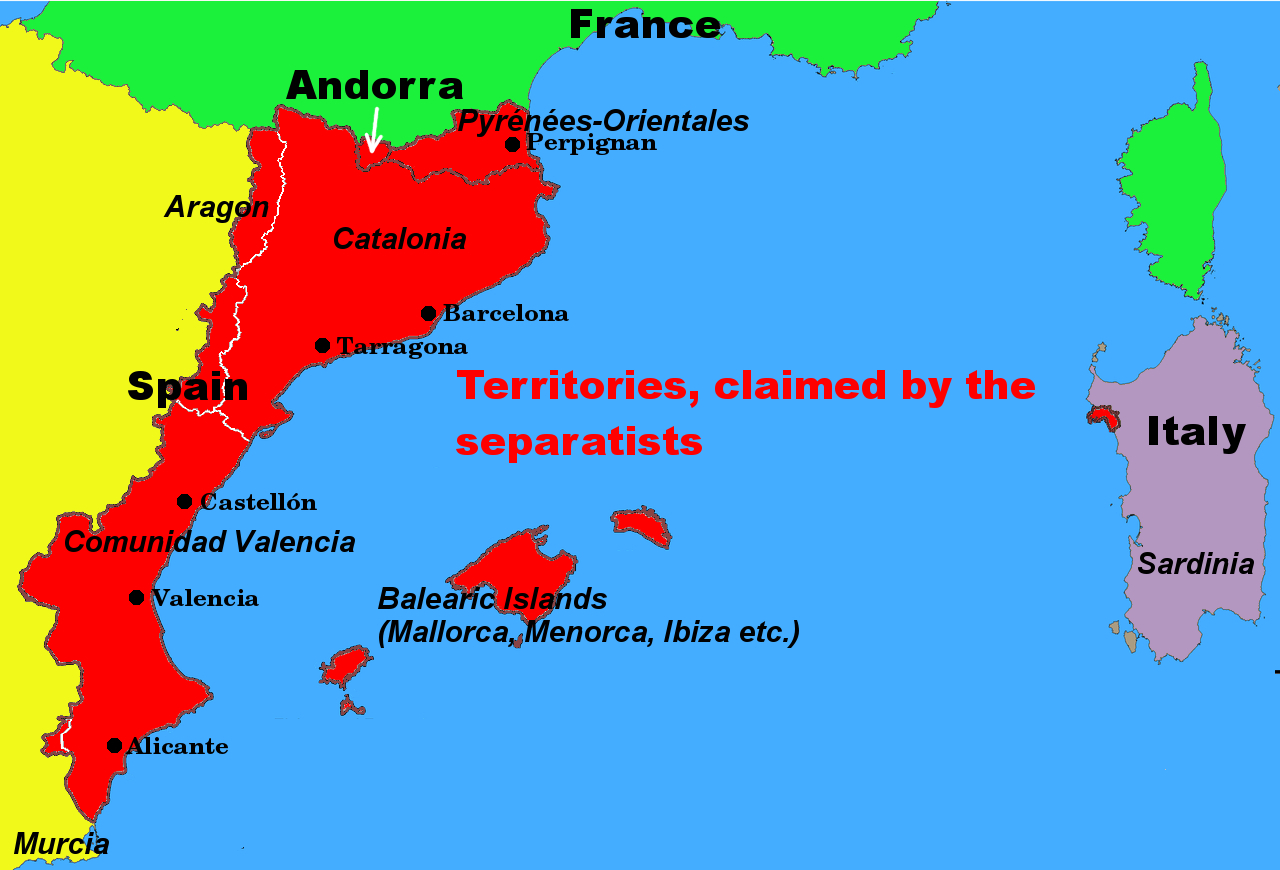Articles from the year
Languages create disputes?
Language dispute and blame
Last week the German Costa Nachrichten (Costa News - CN) published an article titled: „A language causing troubles“. This article was accompanied by a picture and the statement: „Supporters of the far-right Vox party in Catalonia demand teaching in Spanish in Catalan schools.“
The picture shows the demonstrators holding up a sign that reads: „Els nens no es toquen“, which roughly means: Leave the kids alone! What is most peculiar is that the demand on this sign is made in Catalan language instead of Spanish.
Thankfully, my letter to the editor on this was printed, along with an article „All Catalan children make wee-wee“.
Click here to read the letter to the editor »
Just a right-winger?
Spanish lessons? Put kids into custody!
„This family that is instrumentalising their son to attack Catalan should lose custody of him, they are psychopaths“ demanded Magí Hildebrandt, Youth Coordinator of the Frente Nacional de Catalunya in a talk show on 8TV and then added via Twitter: „Some (Spanish) settlers are willing to do anything to attack Catalonia, including using a five-year-old child for colonial activism, which is disgusting“.
What triggered this hate speech? The parents of a child had demanded, in accordance with Catalan laws, and won a judgement, that she receive at least 25% Spanish instruction at school and that not all instruction be in Catalan.
Click here to read »
The language dispute is back in full force
Separatists, facts and justice
There are still people who simply cannot believe that pupils in Catalonia are limited in their ability to learn Spanish, although the mother tongue of the majority of Catalans is Spanish and not Catalan. It's almost as if in Cardiff they only teach in Welsh.
However, the headlines of the last few days regarding the verdicts of the highest Spanish and Catalan courts as well as the behaviour of the separatist government of Catalonia prove this limitation is a fact beyond doubt.
The conditions in Valencia's schools are quite similar to those in Catalonia, even if they are not yet as „advanced“. But for this progress, a lot of money flows from Catalonia to their so-called „països catalans“ (Catalan countries).
Click here to read »
Madrid subsidies for Catalonia
Who's going to pay for it?
Probably a very large majority of Catalans want to maintain their culture and their three languages. That's okay it needs money for that from the state that's also okay but who should pay for the maintenance of Catalan, one of the Catalan languages?
Spain, from which the separatists seek independence? Spain, with which they want nothing to do and which is therefore portrayed as fascist by many separatists.
And for whom is the money? The separatists have made an offer to the Spanish government that they could not refuse.
Click here to read »
How indoctrination works
The baddie speaks Spanish!
On 27 August this year, the state-funded Catalan TV3 broadcast a children's programme in which the little girl Kia is playfully frightened. In itself, it is a harmless affair and the villain is a man dressed up as an octopus, as is typical for the country.
Unfortunately, I only found out about this event now. However, it is worth watching the document published on Youtube, which lasts only 45 seconds, because it makes the daily indoctrination of the separatists very clear.
I have translated the short play dialogue in the following text, there is also the link to the recording of the children's programme (Programa infantil) with the heading: „El malo habla en español“ (The bad guy speaks Spanish).
Click here to read »
The influence of language and media
Facts and figures on the structure of Catalonia
The Election Observation Commission (OCE) of the Societat Civil Catalana (SCC), an organisation of opponents of Catalan separatism, presented an extensive study in September on the correlations and structures of voting behaviour, language, income and media consumption in Catalonia.
In it, statistical data is presented that show clear correlations between secession attachment, feelings of belonging or national identity, media and family language. Monthly household net income, ideological self-positioning, age and some indications of relevant linguistic issues of the respondents are also examined.
I have translated and annotated some of the results:
Click here to read »
Arrested in Sardinia
Puigdemont and the language police
Today's headlines: Puigdemont arrested in Sardina. Anyone familiar with the imperial claims of the separatists knows that he only imagines himself on „home“ soil. Parts of Sardinia are claimed by the separatists as „países catalanes“.
Yesterday's headlines: Language spying on pupils in the playground has not been enough for the separatists for a long time. With the activation of a plan for Catalan immersion at the universities, a blacklist for university professors who teach in Spanish is introduced at the same time. How is that related?
Click here to find out »
Understanding multilingualism
If you are poor, you hardly need Spanish.
Vicent Marzá, Valencian Minister of Education said on Monday: „The number of pupils taught in Valenciano is increasing from 28% to 61%.“ The Region of Valencia has removed the „dividing lines“ and „now all children would have the same opportunities to learn all languages and of course first and foremost our language, Valenciano.“
The percentages from 28 to 61% refer only to the public schools. Those who can somehow afford financially send their children to a private school, because „our“ language is not primarily Valenciano and where are the „dividing lines“?
Click here to find out »
How the parties understand elections and multilingualism
More language imposition in Valencia!
The holidays have begun and it is time in schools and administrations to extend the language imposition. This is what the ESO (secondary = pupils from 11-16) in the Comunidad Valenciania is now facing in a thicket of laws, regulations and countering court decisions. They call it multilingualism and the whole thing builds on the fact that Valenciano language imposition was already extended for those starting school in 2018.
The Valencian government pretends that this is democratically legitimate. Do the people have choice?
Click here to find out »
Resistance is growing
Language imposition or Bilingualism?
With the relaxation that is now taking place in Spain, there are also more opportunities again to fight the language imposition.
While resistance is growing in the province of Alicante, which is the southern part of the Valencian community, Catalonia is demonstrating what it means by language imposition and bilingualism.
Click here to read the article »
Valencia, May 22
Start signatures for petition
At the end of 2018, the organisation „Hablamos Español“ had collected over 500,000 signatures for a petition demanding freedom of choice of language. For formal reasons, only 455,685 signatures were recognised.
Due to the crisis, Hablamos Español has only now started collecting petitions again. The start was marked by numerous demonstrations and car parades in various cities.
Click here to read the article »
All quiet?
Language imposition - a smouldering conflict
The Corona policy overshadows everything. Unfortunately, this does not mean that the language conflict has been defused. It continues to smoulder under the surface.
This can be seen in the demands of those who demand the freedom to choose the language of instruction and those who want to prevent this in favour of language imposition. The consequences for the pupils who have to suffer under this policy are frightening.
Click here to read the article »
Language imposition: It's getting worse
Valencia's linguistic project - a farce!
Time and time again, the separatists in the Valencian government hide their language imposition to speak behind high-sounding names. But time and time again, but in reality, it is clear that they follow only their own intention and agenda: The suppression of everything Spanish and the compulsory use of Valenciano in schools as a means of indoctrination towards secession from Spain and incorporation into the imperial entity of „Independent Catalonia“.
At the moment, the children can still go to school, but think about what it means for the students whose parents do not know Valenciano and whose support and help they need when homeschooling. Many teachers certainly see it that way, and reports about the practice of this linguistic project are coming to light more and more.
The organisation „Hablamos Español“ reported on 29 January that secondary school teachers are concerned about the way this linguistic project will be implemented. I have translated this report.
Click here to read the translation“ »
Subscribe Now!
Myths and deceptions of Catalan nationalism

Here you'll find the translation
The strategy of recatalanization
 1980 the Spanish journal "El Periodico" published a secret document about the strategy of the Catalan government. It shows in a frightening way the actual spiritual world of the separatist leaders.
1980 the Spanish journal "El Periodico" published a secret document about the strategy of the Catalan government. It shows in a frightening way the actual spiritual world of the separatist leaders.Now it is available in english translation.
Pancatalanism
the separatist's imperial claim
 The Catalan government exports the conflict into communities with Catalan population, supporting all efforts of the separatists including financial means to destroy Spain.
The Catalan government exports the conflict into communities with Catalan population, supporting all efforts of the separatists including financial means to destroy Spain. An important tool is the establishment of a language dictatorship that is not afraid to use the same means as Franco.
Separatist indoctrination

Click here to read the study
Language imposition and democracy

An essay in 6 parts on the potentially violent effect of language imposition containing contributions from South Africa, Catalonia, Ukraine and France.
go to part 1
Publications
 The title says: "Catalonia, a conflict is exported. Insights of a migrant"
The title says: "Catalonia, a conflict is exported. Insights of a migrant"Sorry, up to now, this book is only available in German. However, drop us a line, if you are interested to learn more Contact.













